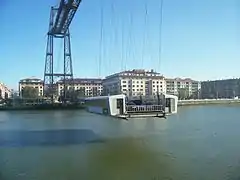gondola
English
Etymology
Borrowed from Italian gondola, from Venetian góndoła, likely to have derived from Byzantine Greek κοντούρα (kontoúra, “small tail”).
Pronunciation
- (UK) IPA(key): /ˈɡɒn.də.lə/
Noun
gondola (plural gondolas or gondole)
- A small long, narrow boat with a high prow and stern, propelled with a single oar, especially in Venice.
- A hanging platform or car for transporting people or cargo.
- An enclosed car attached to a cable mechanically lifted up the side of a mountain; an enclosed ski lift; a cable car.
- The car or basket of a hot-air balloon, airship, zeppelin, etc.
- The hanging cart in which a glass-cleaning worker stands to clean exterior glass on tall buildings.
- That part of a transporter bridge that carries passengers, vehicles, along the length of the bridge span.
- (rail transport, US) A type of open railway car with low sides, used to carry heavy freight such as crushed rock or steel.
- A free-standing shelving unit in a supermarket.
Derived terms
Translations
narrow boat, especially in Venice
|
|
enclosed car suspended to a cable onto which it travels
|
car or basket of an airship
part of a transporter bridge that carries
hanging cart in which a worker performs maintenance to an exterior wall of a building
Verb
gondola (third-person singular simple present gondolas, present participle gondolaing, simple past and past participle gondolaed)
- To travel by gondola.
Gallery
 a Venetian gondola
a Venetian gondola a rail transport gondola wagon
a rail transport gondola wagon a modern airship gondola
a modern airship gondola a transporter bridge gondola
a transporter bridge gondola a ski lift gondola
a ski lift gondola a window cleaners' gondola
a window cleaners' gondola
Further reading

Hungarian
Pronunciation
- IPA(key): [ˈɡondolɒ]
- Hyphenation: gon‧do‧la
Noun
gondola (plural gondolák)
Declension
| Inflection (stem in long/high vowel, back harmony) | ||
|---|---|---|
| singular | plural | |
| nominative | gondola | gondolák |
| accusative | gondolát | gondolákat |
| dative | gondolának | gondoláknak |
| instrumental | gondolával | gondolákkal |
| causal-final | gondoláért | gondolákért |
| translative | gondolává | gondolákká |
| terminative | gondoláig | gondolákig |
| essive-formal | gondolaként | gondolákként |
| essive-modal | — | — |
| inessive | gondolában | gondolákban |
| superessive | gondolán | gondolákon |
| adessive | gondolánál | gondoláknál |
| illative | gondolába | gondolákba |
| sublative | gondolára | gondolákra |
| allative | gondolához | gondolákhoz |
| elative | gondolából | gondolákból |
| delative | gondoláról | gondolákról |
| ablative | gondolától | gondoláktól |
| Possessive forms of gondola | ||
|---|---|---|
| possessor | single possession | multiple possessions |
| 1st person sing. | gondolám | gondoláim |
| 2nd person sing. | gondolád | gondoláid |
| 3rd person sing. | gondolája | gondolái |
| 1st person plural | gondolánk | gondoláink |
| 2nd person plural | gondolátok | gondoláitok |
| 3rd person plural | gondolájuk | gondoláik |
Derived terms
- gondolás
- gondolázik
References
- Zaicz, Gábor. Etimológiai szótár: Magyar szavak és toldalékok eredete (’Dictionary of Etymology: The origin of Hungarian words and affixes’). Budapest: Tinta Könyvkiadó, 2006, →ISBN
Italian
Etymology
Borrowed from Venetian góndoła, probably from Byzantine Greek κοντούρα (kontoúra, “small tail”).
Pronunciation
- IPA(key): /ˈɡon.do.la/
- Hyphenation: gón‧do‧la
Derived terms
Derived terms
Anagrams
This article is issued from Wiktionary. The text is licensed under Creative Commons - Attribution - Sharealike. Additional terms may apply for the media files.